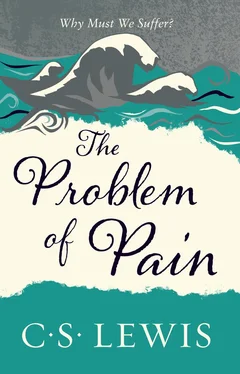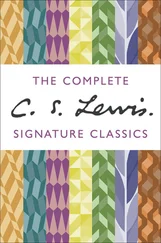The fourth strand or element is a historical event. There was a man born among these Jews who claimed to be, or to be the son of, or to be ‘one with’, the Something which is at once the awful haunter of nature and the giver of the moral law. The claim is so shocking—a paradox, and even a horror, which we may easily be lulled into taking too lightly—that only two views of this man are possible. Either he was a raving lunatic of an unusually abominable type, or else He was, and is, precisely what He said. There is no middle way. If the records make the first hypothesis unacceptable, you must submit to the second. And if you do that, all else that is claimed by Christians becomes credible—that this Man, having been killed, was yet alive, and that His death, in some manner incomprehensible to human thought, has effected a real change in our relations to the ‘awful’ and ‘righteous’ Lord, and a change in our favour.
To ask whether the universe as we see it looks more like the work of a wise and good Creator or the work of chance, indifference, or malevolence, is to omit from the outset all the relevant factors in the religious problem. Christianity is not the conclusion of a philosophical debate on the origins of the universe: it is a catastrophic historical event following on the long spiritual preparation of humanity which I have described. It is not a system into which we have to fit the awkward fact of pain: it is itself one of the awkward facts which have to be fitted into any system we make. In a sense, it creates, rather than solves, the problem of pain, for pain would be no problem unless, side by side with our daily experience of this painful world, we had received what we think a good assurance that ultimate reality is righteous and loving.
Why this assurance seems to me good, I have more or less indicated. It does not amount to logical compulsion. At every stage of religious development man may rebel, if not without violence to his own nature, yet without absurdity. He can close his spiritual eyes against the Numinous, if he is prepared to part company with half the great poets and prophets of his race, with his own childhood, with the richness and depth of uninhibited experience. He can regard the moral law as an illusion, and so cut himself off from the common ground of humanity. He can refuse to identify the Numinous with the righteous, and remain a barbarian, worshipping sexuality, or the dead, or the lifeforce, or the future. But the cost is heavy. And when we come to the last step of all, the historical Incarnation, the assurance is strongest of all. The story is strangely like many myths which have haunted religion from the first, and yet it is not like them. It is not transparent to the reason: we could not have invented it ourselves. It has not the suspicious a priori lucidity of Pantheism or of Newtonian physics. It has the seemingly arbitrary and idiosyncratic character which modern science is slowly teaching us to put up with in this wilful universe, where energy is made up in little parcels of a quantity no one could predict, where speed is not unlimited, where irreversible entropy gives time a real direction and the cosmos, no longer static or cyclic, moves like a drama from a real beginning to a real end. If any message from the core of reality ever were to reach us, we should expect to find in it just that unexpectedness, that wilful, dramatic anfractuosity which we find in the Christian faith. It has the master touch—the rough, male taste of reality, not made by us, or, indeed, for us, but hitting us in the face.
If, on such grounds, or on better ones, we follow the course on which humanity has been led, and become Christians, we then have the ‘problem’ of pain.
Nothing which implies contradiction falls under the omnipotence of God.
THOMAS AQUINAS,
Summ. Theol ., I aQ XXV, Art 4
‘If God were good, He would wish to make His creatures perfectly happy, and if God were almighty He would be able to do what He wished. But the creatures are not happy. Therefore God lacks either goodness, or power, or both.’ This is the problem of pain, in its simplest form. The possibility of answering it depends on showing that the terms ‘good’ and ‘almighty’, and perhaps also the term ‘happy’, are equivocal: for it must be admitted from the outset that if the popular meanings attached to these words are the best, or the only possible, meanings, then the argument is unanswerable. In this chapter I shall make some comments on the idea of Omnipotence, and, in the following, some on the idea of Goodness.
Omnipotence means ‘power to do all, or everything’. fn1
And we are told in Scripture that ‘with God all things are possible’. It is common enough, in argument with an unbeliever, to be told that God, if He existed and were good, would do this or that; and then, if we point out that the proposed action is impossible, to be met with the retort ‘But I thought God was supposed to be able to do anything’. This raises the whole question of impossibility.
In ordinary usage the word impossible generally implies a suppressed clause beginning with the word unless . Thus it is impossible for me to see the street from where I sit writing at this moment; that is, it is impossible to see the street unless I go up to the top floor where I shall be high enough to overlook the intervening building. If I had broken my leg I should say ‘But it is impossible to go up to the top floor’—meaning, however, that it is impossible unless some friends turn up who will carry me. Now let us advance to a different plane of impossibility, by saying ‘It is, at any rate, impossible to see the street 50 long as I remain where I am and the intervening building remains where it is.’ Someone might add ‘unless the nature of space, or of vision, were different from what it is’. I do not know what the best philosophers and scientists would say to this, but I should have to reply ‘I don’t know whether space and vision could possibly have been of such a nature as you suggest.’ Now it is clear that the words could possibly here refer to some absolute kind of possibility or impossibility which is different from the relative possibilities and impossibilities we have been considering. I cannot say whether seeing round corners is, in this new sense, possible or not, because I do not know whether it is self-contradictory or not. But I know very well that if it is self-contradictory it is absolutely impossible. The absolutely impossible may also be called the intrinsically impossible because it carries its impossibility within itself, instead of borrowing it from other impossibilities which in their turn depend upon others. It has no unless clause attached to it. It is impossible under all conditions and in all worlds and for all agents.
‘All agents’ here includes God Himself. His Omnipotence means power to do all that is intrinsically possible, not to do the intrinsically impossible. You may attribute miracles to Him, but not nonsense. This is no limit to His power. If you choose to say ‘God can give a creature free will and at the same time withhold free will from it’, you have not succeeded in saying anything about God: meaningless combinations of words do not suddenly acquire meaning simply because we prefix to them the two other words ‘God can’. It remains true that all things are possible with God: the intrinsic impossibilities are not things but nonentities. It is no more possible for God than for the weakest of His creatures to carry out both of two mutually exclusive alternatives; not because His power meets an obstacle, but because nonsense remains nonsense even when we talk it about God.
Читать дальше












